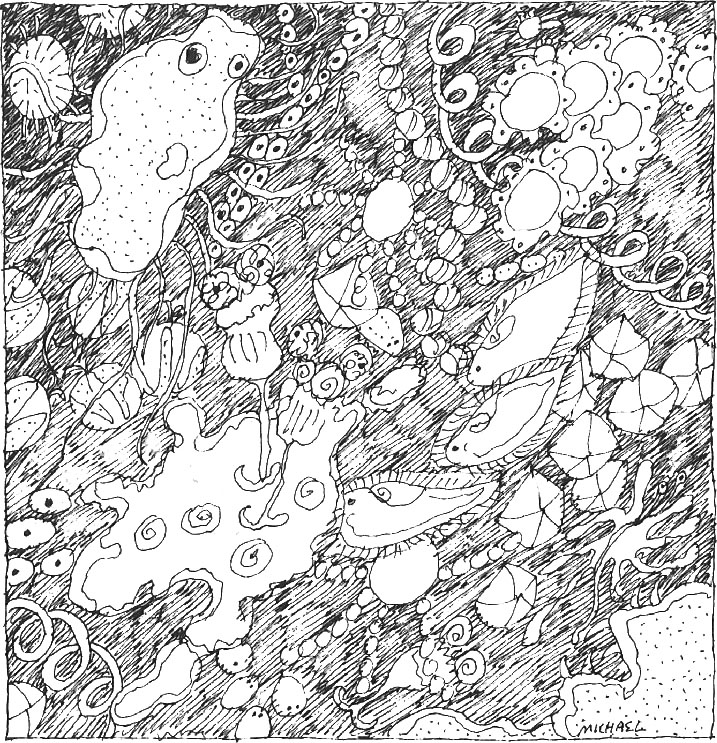
There was an atmosphere of general depression and overriding gloom among the delegates who were feeding on the compost with a marked lack of enthusiasm and were multiplying at an almost minimal rate. The causes of the despondency were neatly summed up by the chairman in his opening address.
“Fellow bugs,” he said, “there is no use beating about the bush. We are, at this moment, virtually on the verge of extinction and the causes are well known to you all.

“Sanitary conditions in this part of the world have reached such a high peak of perfection that we have literally been relegated to the dung-heap. Indeed, where once we had established flourishing colonies in almost every home, every food shop, and every restaurant in the West, we have now been reduced to relying exclusively on equine excreta for our sustenance.”
At this point, a salmonella began fidgeting in his seat and tried to catch the chairman’s eye. But the chairman went on: “With his refrigerators, cellophane wrappings, disinfectants, antibiotics, inspections, pasteurizations, and high health standards, iniquitous man has placed our normal sources of food completely out of reach. And as if this were not enough, man has the colossal nerve to make use of us in sewage treatment plants, to make alcohol and a whole range of products that derive from fermentation and from the enzymes we produce. He even uses us to make the antibiotics that kill us. And his thanks to us for all this, and for producing the B-complex vitamins he needs in our travels through his digestive tract, is to deprive us of such goodies as rotten meat, rotten fish, and other delicacies of the bug table.
“The question is, fellow bugs, what does the future hold? Is there anything we can do to stop the roter, figuratively speaking of course, ha, ha, rot is the last thingwe want to stop. Now I believe there is a bug in the audience who has something to say to us. Meanwhile, excuse me while I multiply.” The chairman grew in size, narrowed at the middle and split into two. The salmonella took his place on the podium and spoke:
“Mr. Chairman, or rather Messrs. Chairmen, fellow delegates. I share everybody’s concern with our predicament and I am fully aware of the impasse we have been brought to. But if sanitary conditions here are such that we can no longer enjoy the good things of life the obvious answer is to move somewhere else. We must simply leave this part of the world and go to a place where cleanliness is not next to godliness.” The salmonella paused to let his words sink in. Then he went on: “I have heard speak of a country, southeast of here, where the inhabitants eat tons of rotten meat every year, where hundreds of crates of decomposed salted cod are sold on the market, and where trillions of our kind can be found living happily in the ice cream sold in the streets and in cafes.”
There were cries of “Ooh” and “Aah!” as all the bugs on the dung-heap sat up and listened.
“What’s more,” the salmonella went on, “there are flourishing colonies of our kind in bottled soft drinks and bottled water which nobody makes any attempt to disturb.”
“Wonderful, wonderful! Magnificent! What a country! Let’s go there at once!” were some of the comments that came from the audience.
“And that is not all,” the salmonella continued, “after our kind have lived and multiplied contentedly in these admirable conditions, they pass unhindered through extremely hospitable digestive tracts and end up in the sea along some of the most beautiful beaches you have ever seen, where they continue to multiply in superb co-existence with thousands of unconcerned bathers. Fellow bugs, if there is a heaven on earth for bacteria, this place is it!”
“What a country! What bliss! When can we start!”
A wiser and more experienced shigella in the audience broke in at this point to say: “I do not doubt for a moment the truth of my colleague’s words and the country he speaks of indeed seems to offer ideal conditions for our future development. However, I find it hard to believe that the symbiosis he speaks of is so perfect that we do not cause gastric disorders among these humans and that they do not attempt to eradicate us with deadly antibiotics. Has our friend anything to say about that?”
The salmonella replied: “A very good question. I myself wondered about that when I was first told about this place. And the answer I got was a very curious one. Apparently, antibiotics are sold without prescription in this country and everybody takes them for the slightest ailment. As a result, the resident colonies of bacteria in their systems have developed an admirable immunity against most antibiotics which they gladly pass on to any newcomers who may bring on gastric upsets in the host.”
“And what about the health authorities in this country? Do they allow all this lovely rotten meat and fish to be sold unhindered?” the shigella went on.
“Indeed they don’t,” the salmonella replied. “Every now and then they carry out an inspection, condemn what they find, and bring charges against the meat merchants or butchers, but these are minor inconveniences compared to the bonanza that lies in wait for us when we go there.”
The audience gave the salmonella a standing ovation at which he blushed deeply, grew bigger, narrowed at the waist and split into two. The older of the two chairmen rose and said: “Well, fellow bugs, this has been indeed a most successful meeting and we are extremely indebted to the last speaker for his valuable information. I take it we are all agreed that we no longer need to stay here and that we should make immediate arrangements to move to this wonderful land he has described to us. All in favour say aye!”
There was a roar of ‘ayes’ from the audience. With the very next favourable wind, the bacteria on the dung-heap lifted themselves into the air and were wafted gently to the local airport. They boarded the first plane heading towards their destination and, as the salmonella attached himself to a stale canape, he laughed gaily and said: “Goodbye dung-heap, hello Greece!”







